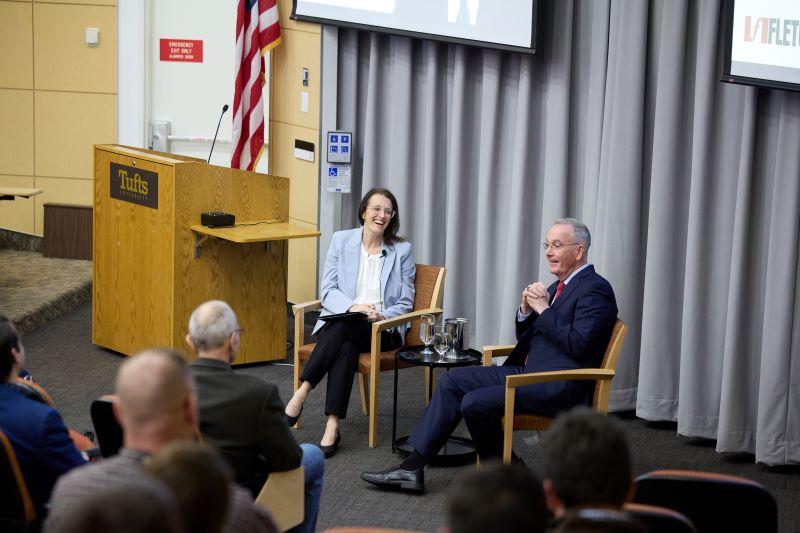-

Hear from Monica Toft, Academic Dean
Learn how Monica Toft, Academic Dean, is shaping the study of global affairs and diplomacy at Fletcher.
Hear from Prof. Toft -

Explore Fletcher academics in action
Fletcher Features offers insights, innovation, stories and expertise by scholars.
Get global insights -
Get application tips right from the source
Learn tips, tricks, and behind-the-scenes insights on applying to Fletcher from our admissions counselors.
Hear from Admissions -

Research that the world is talking about
Stay up to date on the latest research, innovation, and thought leadership from our newsroom.
Stay informed -
Meet Fletcherites and their stories
Get to know our vibrant community through news stories highlighting faculty, students, and alumni.
Meet Fletcherites -

Forge your future after Fletcher
Watch to see how Fletcher prepares global thinkers for success across industries.
See the impact -

Global insights and expertise, on demand.
Need a global affairs expert for a timely and insightful take? Fletcher faculty are available for media inquiries.
Get in Touch
To Be Part of Something Bigger than Yourself
General Joseph F. Dunford, Jr. F92 visits campus to discuss careers in public service

During a visit to campus last week, General Joseph F. Dunford, Jr. F92 began conversation with an audience poll. He asked how many in attendance think the government is as effective as they’d like it to be, how many think the quality of civil discourse is what it ought to be, and how many think their country’s population can agree on their basic values. This led to his final question: how many believe work in the public service might be important.
Last week, students at The Fletcher School were treated to a special kind of career talk: a personal and candid discussion about public service between Academic Dean Kelly Sims Gallagher and General Dunford, who served from October 2015 to September 2019 as the 19th chairman of the Joint Chiefs of Staff, the nation’s highest ranking military officer and principal military advisor to the President, Secretary of Defense, and National Security Council.
Their conversation, entitled, “Why Choose Public Service,” walked students through the value and impact of careers in the public sector.
With a father who served as a marine during the Korean War, General Dunford grew up with the impression that there was esteem associated with pursuing a career in public service. As an undergraduate, he met with Air Force recruiters during orientation and learned about a path of service out of college, after which he would become an officer in the U.S. military. He later connected with a recruiter from the Marines and committed to the two-year reserve obligation.
“You’ve got to go out there and do something that’s about more than you,” he said, “and so I signed up for that initial two-year obligation that turned into 42 years of active duty, which is a much longer story.”
While General Dunford spoke to the benefits of his career, he also situated students inside his thought process as an undergraduate.
“I’m not going to tell you that the day I decided to serve in active duty as a marine I appreciated that I was being a part of something bigger than myself. I’m also not going to tell you that everything I was thinking of at the time was altruistic ideals; I was just like everyone else at 19, 20, or 21,” he said. “It was probably a combination of family expectations, looking for a challenge, having to make a decision to do something—there’s a lot of things, in full candor, that cause you to make those first steps.”
Dean Gallagher noted a decline in the number of recent Fletcher graduates who pursue careers in the public service upon graduation, and the two discussed the drawbacks to such careers, from financial compensation to the personal toll. General Dunford and his family moved 22 times, and he estimated that they spent at least nine years separated due to work assignments. While the challenges were significant, he asserted that the rewards, too, were great.
“In government, or in public service more broadly, you can have an impact typically that far exceeds what any individual could hope to accomplish on their own. You really are part of something,” he said.
Dean Gallagher echoed this sentiment, sharing stories of moments from her career that illuminated where her interest and passion resided. For both of them, this process of discovery was essential, and they encouraged students to pursue excitement where they find it.
The evening concluded with questions from the audience, ranging from retention in public service careers to how personal politics affect behavior in the public sector. Responding to a student who shared that higher education is criticized in her home country, General Dunford concluded the evening with a message on the value of a Fletcher education.
“If training is what to do and education is how to think, I don’t know how an experience at someplace like Fletcher can’t be useful to a senior leader who is, at the end of the day, paid to think about problems for which there is no checklist with a solution on it,” he said. “The broad exposure that you get, and the multidisciplinary approach of the school, is a reflection of real life.”
“I tell people in four years as the chairman of the U.S. Joint Chiefs of Staff, I never dealt with a military problem at the strategic level,” he added. “I dealt with strategic problems that had a military dimension. Anyone who says a multidisciplinary education is not important has never actually had to solve problems at the strategic level and sit around with a diverse team that represents multiple different agencies in and out of the problem and say, this is the problem we have to solve, how do we do it?”
Read more about Fletcher’s MA degree program.

